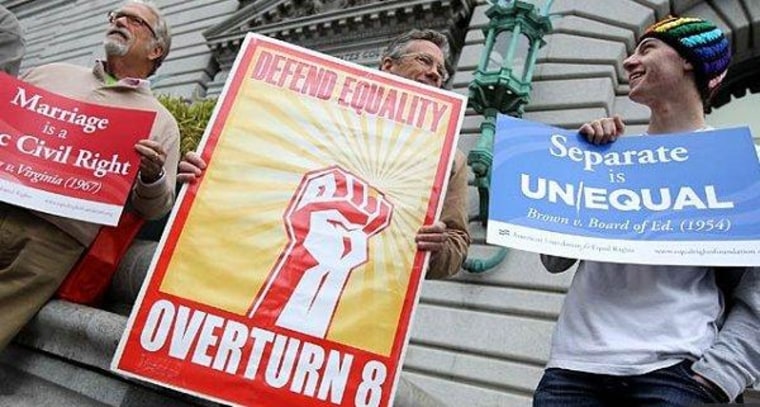It will be a historic day at the Supreme Court this morning, as part of a historic week. Today, the justices will consider the constitutionality of California's ban on same-sex marriage, a law generally known as Proposition 8, followed by related arguments tomorrow challenging the legality of the Defense of Marriage Act. Let's briefly review what to expect today.
At issue is a case called Hollingsworth v. Perry, brought forward by legal heavyweights -- David Boies and former Solicitor General Ted Olson, who faced off against one another in Bush v. Gore -- challenging California's ban, approved in 2008. They were successful at both the federal district court and the Ninth Circuit Court of Appeals, though as Adam Liptak explained, the latter court issued a narrower ruling: the jurists concluded that "voters were not entitled to withdraw a constitutional right once it had been established by the State Supreme Court."
The reasoning appeared calculated to appeal to Justice Anthony Kennedy, and if upheld, it would not automatically invalidate other bans on marriage equality in other states. More on him later.
In terms of what to watch for today, the issue is not altogether straightforward. Rather, as we discussed several weeks ago, it's important to keep an eye on what standard the high court prefers when weighing the case. As Emily Bazelon explained:
When laws treat one class of people differently from another, as Prop 8 and DOMA do, the Supreme Court has a choice. It can strike down such laws only if they have no rational basis. Or it can look more closely, and ask whether the law passes the test of "heightened scrutiny" (the standard in sex discrimination cases) or "strict scrutiny" (the standard when discrimination on the basis of race, ethnicity, or religion is at issue). The justices have never applied one of these higher standards in a gay rights case. But some lower courts have used the heightened scrutiny tests in same-sex marriage cases.Will the justices move in that direction? Personally, I think there's no rational basis for banning gay marriage. The myth that children fare worse when raised by gay parents, for example, has been shredded by social science. But if the court went for heightened scrutiny in the context of gay marriage, that would make it easier for gay people to sue over employment discrimination or mistreatment as well.
For opponents of marriage equality, this means they're tasked with defending Prop 8 by explaining how it's "substantially related to an important governmental objective." And for the right, that's awfully difficult -- why in the world would the government need to stop two consenting adults who fall in love and want to get married from doing so? -- and leads to easily mocked arguments such as the one over "unplanned and unintended offspring."
We probably won't see a ruling until June, but it's also worth keeping in mind that there's a wide range of possible outcomes.
The court may say the Constitution requires all states to allow gay and lesbian couples to marry. At the other extreme, the court may say the Constitution is silent on the question, leaving states free to allow or reject same-sex marriage. (There is no possibility that the court would ban same-sex marriage in places that choose to permit it.)There are also intermediate possibilities. The court could adopt a rationale that would apply only to California along the lines of the one endorsed by the Ninth Circuit. It could adopt the "eight-state solution" suggested by the Obama administration. Or it could dismiss the case for want of standing, which would probably effectively allow same-sex marriages in California, the nation's most populous state.
The mere possibility that the Supreme Court could end the national debate is exciting -- justices have the power to simply declare that same-sex couples have a constitutional right to marry. As Greg Sargent noted yesterday, the court majority has an opportunity to "transform the national civil rights landscape for gay and lesbian Americans," and in one ruling, could make marriage equality "the law of the land everywhere in the United States."
Or it may disappoint. Or it may strive for some muddled middle ground. Or it may punt on procedural grounds. We'll get our first real hints on the justices' thinking when arguments start around 10:15 a.m. eastern.
